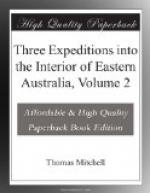Soon after passing the island a few low, sandy-looking hills appeared before us; and we found ourselves between two basins where in the water was very shallow although we had sounded just previously to entering one of them in four fathoms. The widest lay directly before us but having no outlet we steered into the other on the right and on rounding a low rocky point we saw the green rolling breakers of the sea through an opening which proved to be the mouth of the river. It consisted of two low rocky points and as soon as we had pulled outside of them we landed on the eastern one. In the two basins we had seen there was scarcely sufficient water to float the boats and thus our hopes of finding a port at the mouth of this fine river were at once at an end. The sea broke on a sandy beach outside and on ascending one of the sandhills near it I perceived Cape Northumberland; the rocks outside called the Carpenters bearing 7 degrees 20 minutes South of West (variation 3 degrees 30 minutes) and being distant, as I judged, about fifteen miles. Mount Gambier bore 23 degrees 40 minutes North of West and a height which seemed near the extreme point of the coast on the eastward and which I therefore took for Cape Bridge water bore 52 degrees East of South.
DISCOVERY BAY.
These points seemed distant from each other about forty miles; the line of coast between forming one grand curve or bay which received this river at the deepest part and which I now named Discovery Bay.
MOUTH OF THE GLENELG.
There was no reef of rocks upon the bar; a circumstance to be regretted in this case for it was obvious that the entrance to this fine river and the two basins was choked merely by the sand thrown up by the sea. The river was four fathoms deep, the water being nearly fresh enough for use within sight of the shore. Unfortunately perhaps for navigation there is but little tide on that coast; the greatest rise in the lower part of the river (judging by the floating weeds) did not exceed a foot. I was too intent on the completion of my survey to indulge much in contemplating the welcome sight of old ocean; but when a plank was picked up by the men on that desolate shore and we found the initials IWB and the year 1832 carved on wood which had probably grown in old England the sea really seemed like home to us. Although it was low water a boat might easily have been got out and it is probable that in certain states of the tide and sand small craft might get in; but I nevertheless consider the mouth of this river quite unavailable as a harbour.
WATERHOLES DUG IN THE BEACH.




